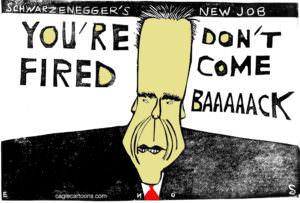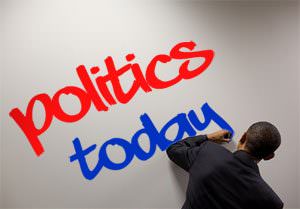Power-Mad Men Have Their Moment
What do a professed love for women, a so-called commitment to family values, a culture of social change and institutionalized rape have in common?
Here we go again. From popular culture to global politics to religion, the rise of mad masculinity is reaching new heights. A few months back we were entertained by Charlie Sheen’s and Chris Brown’s bad behavior. Now, Dominique Strauss-Kahn, Arnold Schwarzenegger, the Catholic Church and Libyan troops are under fire for misogyny and/or sexual abuse. Recent events have led Time Magazine and others to ask an important, if ineloquent, question: Why are some men such pigs?
Here’s a recount of oinkers from recent days. Strauss-Kahn, now the former head of the International Monetary Fund, is arrested on a plane after allegedly raping a 32-year-old maid at a posh Manhattan hotel. In addition, Strauss-Kahn is alleged to have a history of forcing himself upon young female subordinates. What’s more, Strauss-Kahn seems to have destroyed his political career and sent shockwaves through French politics. When asked about his weaknesses, Strauss-Kahn described them as “money, women, and my Jewishness.” He continued, “Yes, I love women, so what?”
Apparently Strauss-Kahn is not the only one who loves women. Former California Gov. Arnold Schwarzenegger’s lady-loving and sexual indiscretions sent tremors through U.S. politics and popular culture this week. After revelation that the ex-governor fathered a love child with a household employee roughly 13 years ago, it should come as no surprise that the 2005 accusations that he had groped several women over the course of his 30-year bodybuilding and acting career might be truer than he let on. Perhaps Schwarzenegger interpreted his Republican commitment to family values as permission to start more than one family.
As if on cue, a study conducted by John Jay College and released by the U.S. Conference of Catholic Bishops referred to the church’s sexual abuse scandal as a relic of the 20th century and that period’s culture of social change. You know; the kind of culture that brought about social and political equality for marginalized groups. This week’s report explains that “the documented rise in cases of abuse in the 1960s and 1970s is similar to the rise in other types of ‘deviant’ behavior in society, and coincides with social change during this time period.’’ Neither priests nor church policies are to blame, and nothing shady occurred after 1979. Unbelievable, isn’t it?
Here’s another unbelievable event. Viagra-fueled gang rapes of Libyan women by Libyan troops. According to CNN, “There are rapes. … They were committed in some police barracks. Were the policemen prosecuted? What happened?” This week’s report surfaced on the heels of Iman al-Obeidi’s claims of being held by several troops at a Tripoli checkpoint who drank whiskey, handcuffed her and gang-raped her. “They tied me up … they even defecated and urinated on me,” she said. “The Gaddafi militiamen violated my honor.”
What do a professed love for women, a so-called commitment to family values, a culture of social change and institutionalized rape have in common?
Power. Power is, ironically, the real weakness.
Power allows the latest crop of madmen—politicians, priests and soldiers—to dominate people in subordinate positions like hotel maids, domestic employees, children and unarmed protesters because they are in subordinate positions. Power allows madmen to behave badly, even violate others’ trust, rights and bodies. And power allows madmen to avoid taking responsibility for their actions.
Power also allows us to decide how to interpret these events. Most of the time we treat events like these as singular cases of individuals gone wild and not as parts of a global culture that values some and devalues others. Power also allows us to turn these images and stories off. It’s as though we’ve accepted the madness, have become bystanders and have succumbed to the bystander effect. We see an emergency and we also see more and more bystanders. As a result it is less likely that any of us will actually help. We assume nothing is wrong, or wrong enough for us to intervene, because nobody else looks concerned. Or, we assume that others will take responsibility and act. Or, we fail to act because we don’t know what others will think of us.
Or, maybe the truth is simpler. Maybe we just don’t know what to do.
Your support matters…Independent journalism is under threat and overshadowed by heavily funded mainstream media.
You can help level the playing field. Become a member.
Your tax-deductible contribution keeps us digging beneath the headlines to give you thought-provoking, investigative reporting and analysis that unearths what's really happening- without compromise.
Give today to support our courageous, independent journalists.





You need to be a supporter to comment.
There are currently no responses to this article.
Be the first to respond.